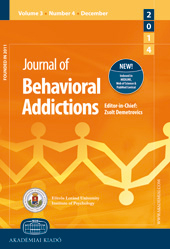Delay Discounting, Risk-Taking, and Rejection Sensitivity Among Individuals With Internet and Video Gaming Disorders
Delay Discounting, Risk-Taking, and Rejection Sensitivity Among Individuals With Internet and Video Gaming Disorders
Author(s): Aviv Weinstein, Hodaya Ben Abu, Yaniv Mama, Ayelet TimorSubject(s): Media studies, Social psychology and group interaction, Experimental Pschology, Behaviorism, Substance abuse and addiction, Social Informatics
Published by: Akadémiai Kiadó
Keywords: Internet and Video Gaming Disorder; risk-taking; delay discounting; impulsivity;
Summary/Abstract: There is a previous evidence for impulsivity in individuals with Internet and Video Gaming Disorders. The aim of this study was to examine whether Internet and video game addictions are associated with experiential delay discounting, risk-taking, and sensitivity to social rejection using computerized tasks and questionnaires. Methods: Twenty participants (mean age 24, SD = 1.55) with high score on the Problematic Online Gaming Questionnaire (POGQ) were compared with 20 participants (mean age 24.8, SD = 1.34) with low score on the POGQ. They performed on computerized Balloon Analog Risk Task and Experiential Delay discounting Task (EDT), and filled in the sensitivity to social rejection questionnaire. Results: Participants with high POGQ scores had lower measures of delay discounting, higher measures of risk-taking, and higher measures of sensitivity to social rejection compared with participants with low POGQ scores. Discussion: The results of this study support the previous evidence of risk-taking and provide new evidence for difficulties in delay discounting and sensitivity to social rejection among those who score high on Internet and video games. Conclusions: The results suggest that Internet- and video game-addicted individuals seek immediate gratification and cannot wait for later reward. Furthermore, these individuals spend time in the virtual world, where they feel safe, and avoid social interactions presumably due to fears of social rejection.
Journal: Journal of Behavioral Addictions
- Issue Year: 5/2016
- Issue No: 4
- Page Range: 674-682
- Page Count: 9
- Language: English

